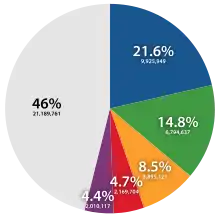Choi (Korean surname)
Choi (Korean: 최; Hanja: 崔) is a Korean family surname. As of the South Korean census of 2015, there were around 2.3 million people by this name in South Korea or roughly 4.7% of the population.[1] In English-speaking countries, it is most often anglicized Choi, and sometimes also Chey, Choe or Chwe. Ethnic Koreans in the former USSR prefer the form Tsoi (Tsoy) especially as a transcription of the Cyrillic Цой.
| Pronunciation | [tɕʰwe] or [tɕʰø] |
|---|---|
| Language(s) | Korean |
| Origin | |
| Meaning | Best, Top, Most, Pinnacle |
| Region of origin | Korea |
| Other names | |
| Alternative spelling | Ch'oe, Tsoi, Chye, Chwe, Chey |
| Variant form(s) | Cui, Thôi |
| Choi | |
| Hangul | |
|---|---|
| Hanja | |
| Revised Romanization | Choe |
| McCune–Reischauer | Ch'oe |
Origin
- According to Samguk Sagi, the Gyeongju clan originates from chief Sobeoldori (소벌도리, 蘇伐都利) of Goheochon (고허촌, 高墟村), one of six villages that united to found Silla; The Gyeongju clan traces their origin back to Choi Chiwon (857–10th century), a noted Korean scholar, philosopher, and poet of the late Unified Silla period (668–935).
- One theory of origin suggests that Haeju clan's progenitor Choi Choong (최충, 崔沖, 984–1068) was given the surname 崔 during the reign of Goryeo king Mokjong.
- The progenitor of the Chungju clan is General Choi Seung (최승, 崔陞), also known as Choi Woo (최우, 崔偶), of Silla (known as Cui Sheng in the Tang dynasty)
- The progenitor of the Nangju clan is Choi Heun (최흔, 崔昕) of Silla who was a native of Yeongam (Nangju) of the southern Jeolla region.
- Choi Ri (최리, 崔理), who was known as the leader of the Kingdom of Nakrang
Clans
There are roughly 160 clans of Chois. Most of these are quite small. However, Choi is the 4th most common surname in Korea. The largest by far is the Gyeongju Choi clan, with a 2000 South Korean population of 976,820. The Gyeongju Choe claim the Silla scholar Choe Chi-won as their founder.[2]

- Haeju clan[2] – Choe Chung
- Saknyeong clan[2] – Choe Hang, Choi Byung Ju (founding member modern era Korean Supreme Court)
- Gangneung clan[2]
- Hwasun clan[2]
- Ganghwa clan[2]
- Yeongcheon clan[2]
- Tamjin clan[2]
- Ubong clan[2] – Choe Hang
- Suwaon clan[2]
- Yeongheung clan[2]
- Suseong clan[2]
- Chungju Choe clan[2]
- Goesan clan – Choe Sejin[3]
- Heunghae clan
- Yeongam clan
- Taein clan
Etymology
Choi is written with the Hanja character 崔, meaning "a governor who oversees the land and the mountain".
Pronunciation
In Korean, 최 is usually pronounced [tɕʰwe] "Chwe" or “Chey” except by some older speakers who pronounce it [tɕʰø] (this vowel sound is similar to the German ö [ø]). In English, it is most often pronounced /ˈtʃɔɪ/ "Choy", which sounds clearly different to its proper pronunciation but some go by “Chey”.
崔 is Romanized as Cuī and pronounced [tsʰwéɪ] in Mandarin Chinese. It is Chēui [tsʰɵ́y] in Cantonese and Chhui [tsʰúi] in Hokkien.
Prominent people of the past
- Choe Chiwon (858-c. 910), Korean philosopher during the Silla dynasty
- Choe Chung-heon (1149-1219), military dictator of the Goryeo period
- Choe U (???-1249), military dictator of the Goryeo period
- Choe Yeong (1316–1388), military general under King Gongmin of Goryeo
- Choe Mu-seon (1325-1395), Korean inventor
- Choe Manri (???-1445), an early critic of hangul
- Choe Sejin (1465-1542), mostly known for his 1525 훈몽자회, aka Hangul for beginners.
- Choe Yeong-kyeong (1529-1590), Westerner, purged during the Gichuk Oksa
- Suk-bin Choe (1670–1718), concubine of Sukjong and mother of Yeongjo of Joseon[4]
- Choe Han-gi (1803-1877), Korean Confucian scholar and philosopher
- Choe Je-u (1824-1864), founder of the Donghak movement
Prominent people today
General
- Dan Choi (born 1981), American LGBT rights activist and former American officer
- Choi Gee-sung (최지성, born 1951), high-ranking Samsung executive
- Choi Hong Hi, South Korean general considered the principal founder of taekwondo
- Jay Pil Choi, American economist
- Choe Jun (1884–1970), businessman and philanthropist
- Choe Nam-seon (1890–1957), Korean historian and independence activist
- Choi Tae-min, South Korean cult leader and founder of Yeongsegyo
- Chey Tae-won, SK chairman
- Choi Wonshik, optical physicist at Korea University
Politicians
- Choi Kyoung-hwan, South Korean politician
- Choi Kyu-hah (1919–2006), transitional President of South Korea following the assassination of Park Chung-hee
- Sergey Tsoy (Choi Yong-eun), Russian politician
- Steven Choi, American politician
- Choe Ryong-hae (b. 1950), North Korean politician and military officer
- Choe Kwang, North Korean general and politician
General
- David Choe (born 1976), Korean American artist
- Choi Han (최한), South Korean voice actor
- Choi Han-bit (최한빛, born 1987), South Korean model
- Kristy Choi, Korean-American filmmaker
- Choi Seong-woo, South Korean voice actor
- Sharon Choi (Choi Sung-jae 최성재, born 1994/1995), Korean-American interpreter and filmmaker
- Choi Soo-jin, South Korean voice actress
- Susan Choi, American novelist
- Choi Won-hyeong, South Korean voice actor
- Choi Yang-il, a.k.a. Yoichi Sai, Japanese film director
- Choe Yong-gon (army commander) (1903-1972), high-ranking North Korean official
Actors and actresses
- Choi Eun-hee (최은희, 1926–2018), South Korean actress once abducted to the North
- Choi Go (born 2012), South Korean actor and model
- Choi Ji-woo, South Korean actress
- Choi Jin-sil (1968–2008), South Korean actress, nicknamed "The Nation's Actress"
- Choi Jung-won (actress, born 1981), South Korean actress
- Choi Jung-yoon, South Korean actress
- Kenneth Choi, American actor
- Choi Kwon-soo, South Korean actor
- Choi Min-sik, South Korean actor
- Choi Ri, South Korean actress
- Choi Sung-eun, South Korean actress
- Choi Sung-kook, South Korean actor and comedian
- Choi Tae-hwan, South Korean actor
- Choi Won-hong, South Korean actor
- Choi Woo-hyuk (actor, born 1985), South Korean actor
- Choi Woo-hyuk (actor, born 1997), South Korean actor
- Choi Woo-shik, South Korean actor
Musicians and idols
- Anita Tsoy, Russian pop singer, wife of Sergey Tsoy
- Choi Bo-min, South Korean actor and singer, member of boy band Golden Child
- Dasuri Choi, South Korean dancer, choreographer, singer and entertainer based in the Philippines
- David Choi, Korean American musician
- Seven (born Choi Dong-wook), South Korean singer
- G.NA (born Gina Jane Choi), Canadian-born South Korean singer
- Choi Hyun-suk, South Korean rapper and member of boy band Treasure
- Wheesung (born Choi Hwee-sung), South Korean singer
- Jennifer Choi, American violinist
- Jenny Choi, American singer and cellist
- Sulli (born Choi Jin-ri), South Korean actress and former member of girl group f(x)
- Changjo (born Choi Jong-hyun), South Korean singer and member of boy band Teen Top
- Choi Jong-hoon, South Korean singer and member of rock band F.T. Island
- Zelo (born Choi Jun-hong), South Korean singer and member of boy band B.A.P
- Choi Jung-in, South Korean singer
- Choi Jung-won, South Korean singer
- Ren (born Choi Min-gi), South Korean actor, singer, and television personality, member of boy band NU'EST
- Choi Min-ho, South Korean rapper and singer, member of boy band Shinee
- Choi Min-hwan, South Korean singer and drummer, member of rock band F.T. Island
- T.O.P (born Choi Seung-hyun), South Korean rapper, actor and singer, former member of boy band Big Bang
- Choi Siwon, South Korean actor and singer, member of boy band Super Junior
- Choi Soo-young, South Korean actress and singer, member of girl group Girls' Generation
- Choi Sung-min, South Korean singer, member of boy band Speed and the co-ed group Coed School
- Bada (born Choi Sung-hee), South Korean singer and musical theatre actress, member of girl group S.E.S.
- Viktor Tsoi, Soviet rock musician, leader of rock band Kino
- Choi Ye-na, South Korean singer and former member of girl group Iz*One
- Choi Young-jae, South Korean actor and singer, member of boy band Got7
- Choi Yoo-jung, South Korean singer, member of girl groups I.O.I and Weki Meki
- Choi Yu-jin, South Korean singer and actress, member of girl groups CLC and Kep1er
- Yuju (born Choi Yu-na), South Korean singer, former member of girl group GFriend
- Hyojung (born Choi Hyo-jung), South Korean singer, member of girl group Oh My Girl
- Arin (born Choi Ye-won), South Korean singer, member of girl group Oh My Girl
- Cui Jian, Chinese rock musician
Sports
- Choi Cheol-han, South Korean professional Go player
- Choe Chol-su (born 1969), North Korean boxer
- Choi Da-bin (born 2000), South Korean figure skater
- Choi Eun-kyung (born 1984), South Korean short track speed skater and double Olympic Champion
- Choi Eun-kyung (field hockey) (born 1971), South Korean former field hockey player
- Hee-seop Choi (born 1979), South Korean former professional baseball player
- Choi Hong-man (born 1980), South Korean kickboxer
- Ji-man Choi (born 1991), South Korean professional baseball player
- Choi Jin-cheul (born 1971), South Korean former footballer
- Choi Jung-won (speed skater) (born 1990), South Korean short track speed skater
- Choi Kwang-jo (born 1942), South Korean martial artist, founder and head of Choi Kwang-Do
- Choi Kyung-ju (born 1970, better known as K. J. Choi), South Korean professional golfer
- Choi Mi-sun (born 1966), South Korean recurve archer
- Choe Myong-ho (born 1988), North Korean footballer
- Choi Myung-hoon (born 1975), South Korean professional Go player
- Choi Na-yeon (born 1987), South Korean professional golfer
- Choi Soon-ho (born 1962), South Korean football manager and former professional footballer
- Choe Song-hyok (born 1998), North Korean footballer
- Choi Sung-kuk (born 1983), South Korean former footballer
- Choi Sung-yong (born 1975), South Korean former footballer
- Choi Tae-uk (born 1981), South Korean former footballer
- Choi Won-jong, South Korean archer
- Choi Won-kwon (born 1981), South Korean former footballer
- Choi Yeon-sung, South Korean retired professional StarCraft player
- Choe Yeong-ui (1923–1994, better known as Mas Oyama), karate master who founded Kyokushin karate
- Choi Yong-soo (born 1973), South Korean footballer
- Choi Yong-soo (boxer) (1972), South Korean retired boxer
- Choi Yong-sool (1904–1986), founder of Hapkido
- Yuhui Choe (born 1986), Japanese-born Korean ballet dancer
- Choi Yu-jin (figure skater) (born 2000), South Korean figure skater
- Choi Yun-kyum (born 1962), South Korean football coach
See also
- Cui – Chinese surname
- Choi
- Tsoi
- List of Korean family names
References
- "2015년 인구주택총조사 전수집계결과 보도자료" [Results of the 2015 Census of Population and Housing survey]. Korean Statistical Information Service. Retrieved 28 May 2019.
- 최 崔 [Choe] (in Korean). Doosan Encyclopedia. Retrieved 2009-09-18.
- 최세진 崔世珍 [Choe Se-jin] (in Korean). Encyclopedia of Korean Culture. Retrieved 2009-09-18.
- Note: suk-bin is a Joseon title, not a given name
